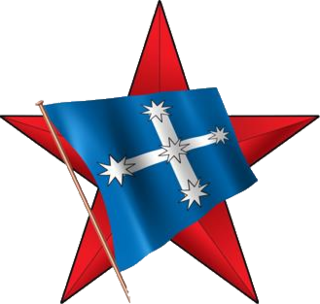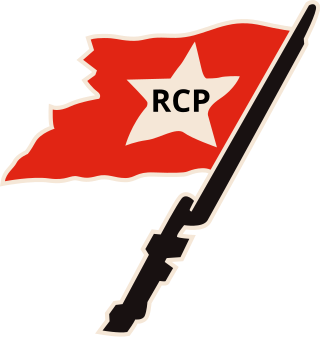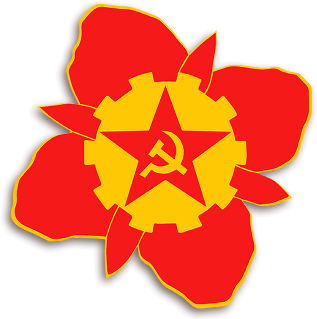Related Research Articles
United States v. Eichman, 496 U.S. 310 (1990), was a United States Supreme Court case that by a 5–4 decision invalidated a federal law against flag desecration as a violation of free speech under the First Amendment. It was argued together with the case United States v. Haggerty. It built on the opinion handed down in the Court's decision the prior year in Texas v. Johnson (1989), which invalidated on First Amendment grounds a Texas state statute banning flag burning.

The Communist Party of India (Marxist–Leninist) (CPI (ML)) was an Indian communist party formed by the All India Coordination Committee of Communist Revolutionaries (AICCCR) at a congress in Calcutta in 1969. The foundation of the party was declared by Kanu Sanyal at a mass meeting in Calcutta on 22 April, Vladimir Lenin's birthday. Later the CPI(ML) party splintered into several Naxalite groups.
The Communist Party USA (Marxist–Leninist) was a small American Maoist group founded in 1965 by Los Angeles members of the Provisional Organizing Committee to Reconstitute a Marxist–Leninist Party (POC) around Michael Laski. Laski stated in a 1968 interview that this split was motivated by dissatisfaction with the POC's response to the Watts riots.
Revolutionary Workers Headquarters (RWH) was a U.S. Marxist-Leninist organization that formed out of a split from the Revolutionary Communist Party (RCP) in 1977. After Mao Zedong, leader of the Communist Party of China, died in 1976, the majority of the RCP's leadership criticized the post-Mao Chinese leadership as "revisionist" and "capitalist-roaders", saying that China was no longer a socialist country.
The New Communist movement (NCM) was a diverse left-wing political movement during the 1970s and 1980s. The NCM were a movement of the New Left that represented a diverse grouping of Marxist–Leninists and Maoists inspired by Cuban, Chinese, and Vietnamese revolutions. This movement emphasized opposition to racism and sexism, solidarity with oppressed peoples of the third-world, and the establishment of socialism by popular revolution. The movement, according to historian and NCM activist Max Elbaum, had an estimated 10,000 cadre members at its peak influence.

The Communist Party of Australia (Marxist–Leninist) (CPA (ML)), is an Australian communist party founded in 1964. The party's origins derived from a split within the Communist Party of Australia (CPA), stemming from the Sino-Soviet split. The party describes its ideology as being influenced by the works of Karl Marx, Friedrich Engels, Vladimir Lenin, Joseph Stalin, Mao Zedong and Ted Hill.

The Young Communist League of Canada (YCL-LJC) is a Canadian Marxist–Leninist youth organization founded in 1922. The organization is ideologically aligned with, but organizationally independent from, the Communist Party of Canada. The organization's members played a leading role in the On-to-Ottawa Trek and made up a significant portion of the Mackenzie–Papineau Battalion, which fought on the Republican side in the Spanish Civil War.
Union of Iranian Communists (Sarbedaran lit. the head-on-gallow mass) (UIC(S); Persian: اتحادیه کمونیستهای ایران) was a Maoist organization in Iran. The UIC(S) was formed in 1976 after the alliance of a number of Maoist groups carrying out military actions within Iran. The group prepared an insurrection starting in 1981, but it was dismantled by 1982.
The League of Revolutionary Struggle (Marxist–Leninist) was a Marxist–Leninist[1] movement in the United States formed in 1978 by merging communist organizations. It was dissolved by the organization's leadership in 1990.

Gregory Lee "Joey" Johnson is an American political activist, known for his advocacy of flag desecration. His burning of the flag of the United States in a political demonstration during the 1984 Republican National Convention in Dallas, Texas, led to his role as defendant in the landmark United States Supreme Court case Texas v. Johnson (1989).

The Revolutionary Communist Party is an anti-revisionist Marxist-Leninist communist party in Brazil with strong Stalinist tendencies. Originally formed in 1966 after a split with the Communist Party of Brazil, it later merged with the October 8th Revolutionary Movement in 1981, from which it split in 1995. It is a member of the International Conference of Marxist-Leninist Parties and Organizations (ICMLPO), an organization of anti-revisionist and Hoxhaist parties. As the party is not registered in Brazil's Superior Electoral Court, its members cannot run for public office.
The American Left can refer to multiple concepts. It is sometimes used as a shorthand for groups aligned with the Democratic Party. At other times, it refers to groups that have sought egalitarian changes in the economic, political, and cultural institutions of the United States. Various subgroups with a national scope are active. Liberals and progressives believe that equality can be accommodated into existing capitalist structures, but they differ in their criticism of capitalism and on the extent of reform and the welfare state. Anarchists, communists, and socialists with international imperatives are also present within this macro-movement. Many communes and egalitarian communities have existed in the United States as a sub-category of the broader intentional community movement, some of which were based on utopian socialist ideals. The left has been involved in both the Democratic and Republican parties at different times, having originated in the Democratic-Republican Party as opposed to the Federalist Party.
The Spartacist League is a Trotskyist political grouping which is the United States section of the International Communist League, formerly the International Spartacist Tendency. This Spartacist League named themselves after the original Spartacus League of Weimar Republic in Germany, but has no formal descent from it. The League self-identifies as a "revolutionary communist" organization.

The Revolutionary Communist Party, USA is a new communist party in the United States founded in 1975 and led by its chairman, Bob Avakian. The party organizes for a revolution to overthrow the system of capitalism and replace it with a socialist state, with the final aim of world communism. The RCP is frequently described as a cult around Avakian.

The Communist Party of Canada (Marxist–Leninist) is a federal political party in Canada. It was founded in 1970 by Hardial Bains, a staunch Stalinist and anti-revisionist. The CPC(M-L) has been registered with Elections Canada as the Marxist–Leninist Party of Canada (MLPC) since 1974, as the party is prohibited from using the name "Communist Party of Canada" in Canadian elections to avoid confusion among voters. The party is not an offshoot of the Communist Party of Canada; its early membership came from student-led organizations active in the 1960s. After a period of alignment with Maoism and China, the CPC(M-L) pursued a Hoxhaist, pro-Albanian line until the early 1990s. At present, the party directs most of its public support to Cuba and North Korea.

Hoxhaism is a variant of anti-revisionist Marxism–Leninism that developed in the late 1970s due to a split in the anti-revisionist movement, appearing after the ideological dispute between the Chinese Communist Party and the Party of Labour of Albania in 1978. The ideology is named after Enver Hoxha, First Secretary of the Party of Labour from 1941 to 1985 and leader of Albania from 1944 to 1985.

The Workers World Party (WWP) is a Marxist–Leninist communist party founded in 1959 by a group led by Sam Marcy. WWP members are sometimes called Marcyites. Marcy and his followers split from the Socialist Workers Party (SWP) in 1958 over a series of long-standing differences, among them their support for Henry A. Wallace's Progressive Party in 1948, their view of People's Republic of China as a workers' state, and their defense of the 1956 Soviet intervention in Hungary, some of which the SWP opposed.
Marxism–Leninism–Maoism (MLM) is a political philosophy that synthesizes and builds upon Marxism–Leninism and the thought of Mao Zedong. Marxism–Leninism–Maoism was first formalized by the Shining Path in 1982.

The Red Guards were American "Marxist–Leninist–Maoist collectives of community organizers and mass workers" originating in Los Angeles and Austin with other branches operating in Kansas City, Pittsburgh, and Charlotte, as well as St. Louis and San Marcos, under the distinct titles of Red Path Saint Louis and San Marcos Revolutionary Front respectively.
Large-scale organized protests by students in the city of Kabul, Afghanistan, paralyzed the education system and led to heavy clashes. The uprisings by students took place from late April to early June 1980, demonstrating against the communist government of Babrak Karmal and the invading Soviet Union forces, calling for freedom and the withdrawal of Soviet forces. The protests were quelled and led to a large number of students being arrested, estimated between 400 and as many as 2,000. Between 72 and 200 students lost their lives in the demonstrations.
References
- ↑ "Revolutionary Communist Youth Brigade Founded!". Revolution. Dec 1977. p. 1.
- ↑ "Revolutionary Communist Youth Brigade (RCYB)". Terrorism Research & Analysis Consortium. Retrieved 2021-05-19.
- ↑ "Revolutionary Communist Youth Brigade Formed". Encyclopedia of Anti-Revisionism On-Line. Retrieved 2021-05-19.
- ↑ "Revolutionary Communist Youth Brigade - AbeBooks". www.abebooks.com. Retrieved 2022-03-24.
- ↑ Frazier, Patrick (1979-05-06). "Anti-nuclear protesters from the Revolutionary Communist Party and Youth Brigade hold a sign that reads "The bomb will not destroy man, man will destroy the bomb!" attributed to Mao Tse-Tung at a demonstration on the U.S. Capitol Grounds in Washington, D."
- ↑ "Los Angeles Review of Books". Los Angeles Review of Books. 2018-08-15. Retrieved 2022-03-24.
- ↑ Galil, Leor (2018-02-23). "What caused the melee outside a Public Enemy and Sonic Youth show at the Aragon in 1990?". Chicago Reader. Retrieved 2022-03-24.